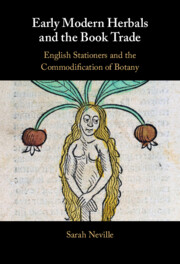‘Sarah Neville's fascinating account of how stationers contributed to the creation of botanical texts brings English herbals and the early modern book trade together for the first time. Her reframing of their history irrevocably alters our sense of their importance for the publishers who commissioned them, the printers who manufactured them, and the booksellers who retailed herbals as well as for the Renaissance physicians, lay medical practitioners, and elite and common readers who so frequently consulted them. Early modern ecocritics will want to read this book along with book historians, historians of science, and those interested in Renaissance literature and culture.'
Valerie Wayne - University of Hawai‘i at Mānoa
'In Early Modern Herbals and the Book Trade, herbals come to life as dynamic objects taking meaning from their print environment. Focusing on the material form of the book provides Neville with a crucial and nuanced tool for unveiling the commercial landscape out of which attitudes toward natural history were indelibly shaped in the early modern era. Rather than relying on an author-centered approach, this book puts printers, booksellers, craftsmen, editors, licensors, translators, playwrights, and readers center stage in the production of botanical knowledge. What we learn is that herbals are much more than repositories of information that mark progress within traditional terms often used by historians of science.'
Wendy Wall
Source: Northwestern University
'Informative, penetrating, and witty, Early Modern Herbals and the Book Trade helps us see anew a genre of book we’re familiar with largely through their sumptuous illustrations. Immersing us in the fascinating world of botanical publications at the front end of the Enlightenment, Neville has produced a study that anyone interested in the early modern era’s engagement with the natural world will want to read.'
Douglas Bruster - The University of Texas at Austin
'This is a unique text … Libraries with collections covering the history of the book and printing, the history of medicine, or Renaissance English literature would do well to add this volume to their shelves … Highly recommended.'
R. C. Hedreen
Source: Choice
‘In this lively, informative book, literary scholar, bibliographer, and book historian Sarah Neville shows how publishers and readers shaped the market for printed herbals, and herbals as material texts, in sixteenth- and early seventeenth-century England. … Historians of science and medicine will profit from attending to Neville’s critical bibliographic, publisher-focused approach to herbals.’
Elizabeth Yale
Source: Isis, a journal of the History of Science Society



